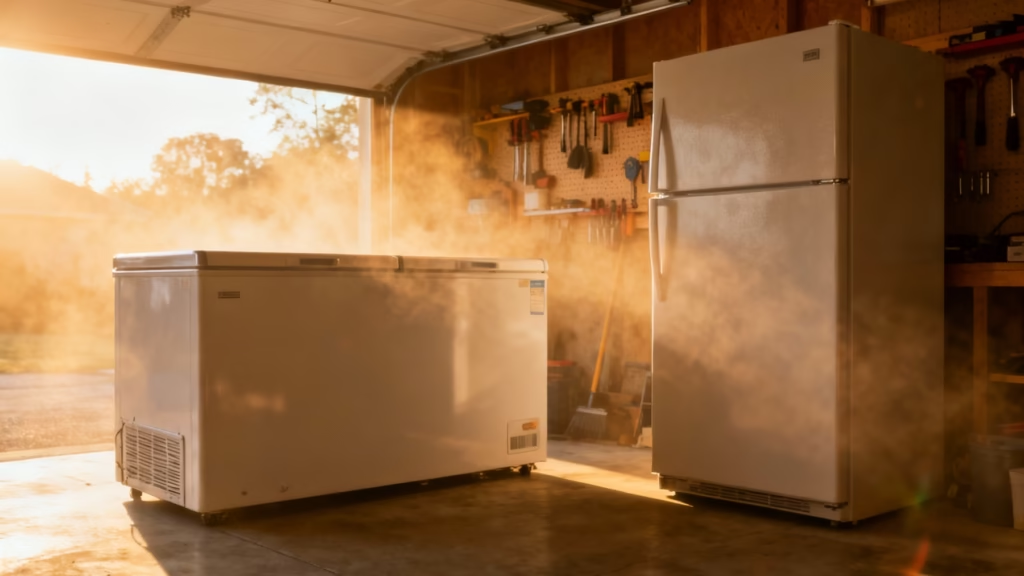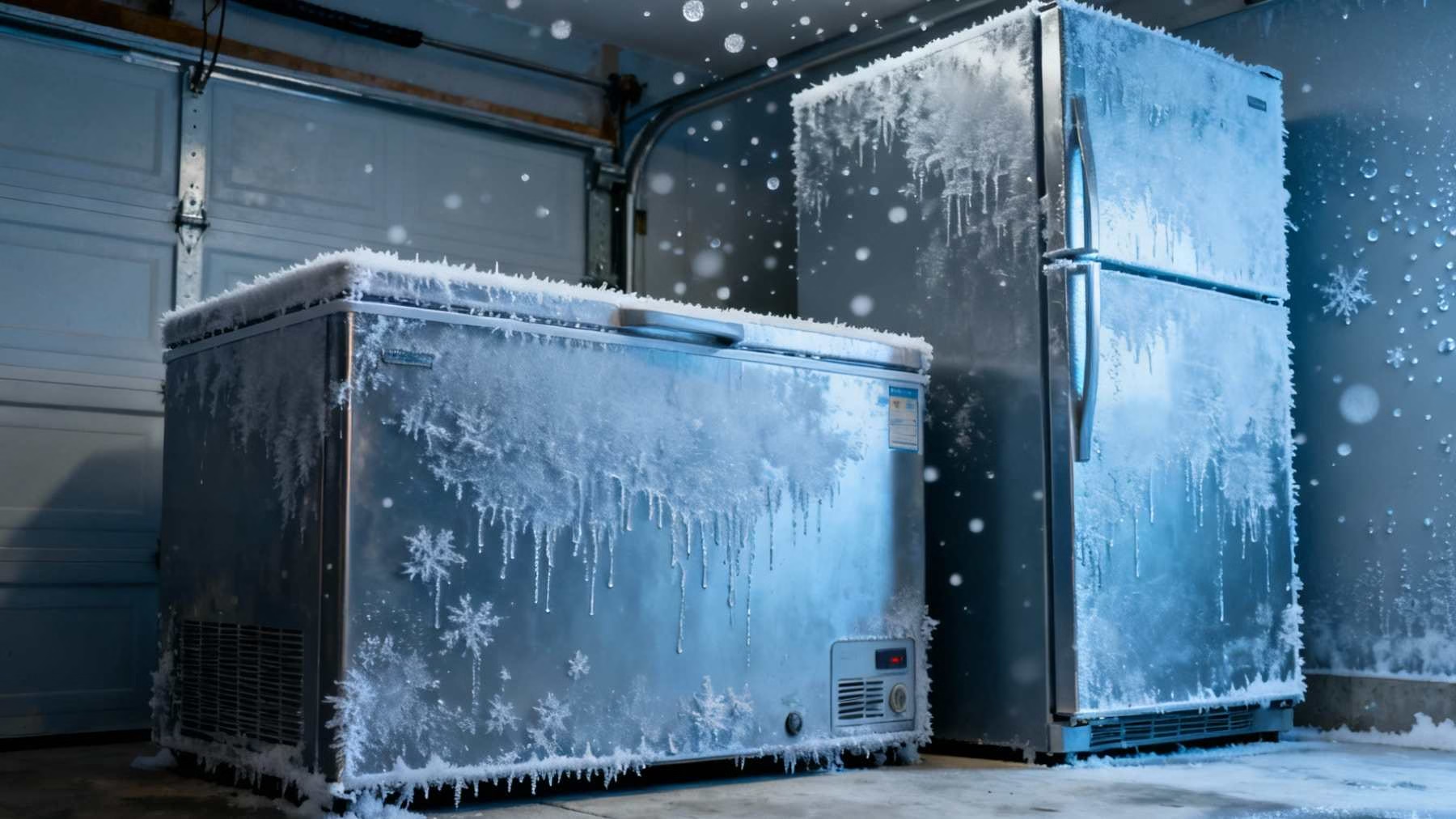Freezers in garages or sheds face tough conditions. These can cause the freezer to not start, turn on and off too much, get too much frost, or wear out early. This guide gives easy steps for your thermostat, adding heaters, getting ready for winter and summer, starting it up right, and keeping an eye on it. This will help your freezer work well all year. Also read about our Top 5 Picks.
Table of Contents
How hot and cold weather hurt your freezer
Very cold and very hot weather stress different parts.
- Cold can stop the compressor from starting. It can also make the oil thick and sticky.
- Heat makes the compressor run longer. This raises pressure inside and causes more wear.
- Quick changes from hot to cold make water form. This leads to rust and frost.
- The controls and sensors may not work right if they get too hot or cold.
For model-level startup behavior and which freezers came with recommended heater kits, see our Best Deep Freezer For Garage review for detailed notes.
Knowing these problems helps you find the right fix.
How to set your thermostat
Mechanical and digital thermostats act differently in tough weather.
- Mechanical ones are simple and strong. They handle big changes in power and temperature well. But they are not as exact.
- Digital ones are precise and can be set. But they don’t like power surges or wetness.
- Some have a safety feature. It stops the compressor from starting too often. This is good for the motor but can be a problem in the cold.
Easy tips:
- Set the thermostat where the maker says to for long-term use. Do not set it too cold.
- In a heat wave, do not keep making it colder. Instead, let more air flow or give it shade.
- If your freezer has a test mode, use it to check the thermostat before bad weather.
Heater kits and warmers for the compressor
If your garage gets very cold, a heater kit can help it start.
What a heater kit does:
- It keeps the compressor area warm. This keeps the oil thin so the motor can start.
- It is put near the compressor or on the bottom. It uses a small amount of power all the time.
How to pick and use a heater kit:
- Make sure it works with your model and will not void the warranty. Some makers sell their own kits.
- Pick a kit made for garages or outdoors. It should have the right parts to attach it.
- Put it on as the directions say. The heat should go to the compressor, not the inside.
- If the kit has a control, use it. This makes the heater turn on only when needed.
Safety and power notes:
- The heater uses power all the time. Be sure the plug and circuit can handle it.
- Use kits that shut off if they get too hot. Always follow the rules for grounding.
Easy ways to keep it warm in winter
Simple steps can lower stress and save energy.
- Put the freezer on a raised, warm mat. This keeps it off cold, wet floors that cause frost.
- You can add a warm blanket to the outside if the maker says it is okay. Do not cover any vents or grilles.
- Seal cracks in the garage and add insulation to the door. This stops big temperature swings near the freezer.
Never block the vents or grilles when you add insulation. These steps help, but you may still need a heater kit for deep cold.
How to start your freezer after very cold weather
If your freezer was in a very cold garage, follow these steps to start it:
- Move it to a warmer spot if the manual says to. Let the compressor and oil warm up to room temperature.
- Wait at least one full day if the book says so. Some models need time for the oil to move inside.
- Look for damage, water inside, or frozen drain lines before you plug it in.
- Turn it on and let it run empty for a few hours. Watch the compressor and inside temperature.
If the compressor makes a noise but does not start, turn it off. Let it get warmer. Trying to start a cold compressor too many times can break it.
Getting ready for summer heat

Hot weather makes the freezer run more and can cause breaks. Get ready for heat with these steps:
- Keep the condenser coils clean and clear. Dust and dirt make it hard for heat to escape.
- Let air flow well. Keep space around it as told. A small fan can blow hot air away from the back.
- Keep the garage or freezer out of the sun. A shiny cover on the garage door or a shade can lower the heat.
- If you need a new freezer, think about an inverter model. These handle high heat better.
Do not put insulation or shiny covers over the vents. Air must always flow.
For immediate recommendations on which freezer to buy for an unheated garage, see the Best Deep Freezer For Garage picks and buying guide.
Handling wetness and water buildup
Wet air makes frost and rust worse. Here’s how to stop it:
- Use a dehumidifier in a damp garage. This lowers wetness in the air and cuts down on frost and rust.
- Keep wet things away from the freezer. Do not store open liquids near it.
- If you see water inside, dry it all and wipe the seals before you start it again. This stops electrical shorts and mold.
In wet weather, defrost and dry it out often to prevent damage.
How to defrost and manage water
For manual defrost chest freezers:
- Defrost when frost is about 1/4 inch thick. Thicker frost makes the freezer work harder.
- Defrost it before a big cold spell or after lots of wet weather.
- Use a plastic scraper and warm water. Do not use sharp tools.
For frost-free upright freezers:
- Keep the drain tubes and pans clean. This stops clogs and ice.
- Check the defrost heater now and then. Clean dust from the fans that remove wet air.
A regular defrost plan stops surprise breaks in bad weather.
Keeping the power safe
Power problems are common in garages. They can harm the controls and compressor.
- Use a strong surge protector made for big appliances. Do not use small, cheap ones.
- If your power often dips or surges, think about a voltage stabilizer.
- Check that the wires and plugs are in good shape and grounded. Be sure the circuit can handle the power needed to start.
Protecting the parts saves money on repairs later.
Watching your freezer and getting alerts
Watching it closely stops small issues from becoming big problems.
- Use a simple appliance thermometer. Put it away from the door to see if the inside temperature is steady.
- Use a Wi-Fi temperature sensor. It can send an alert to your phone if it gets too hot or cold.
- Use a power outage detector too if you store important things. This tells you if the power goes out.
This is very helpful if your garage is separate or you are away a lot.
Quick fixes in an emergency
If bad weather hits fast, these steps can help for a short time:
- For a cold start, move it to a warmer spot. Or use a safe room heater near the compressor if the manual allows. Never use open flames.
- If it is too hot, use fans to move air. Shade the unit. Let hot air out of the garage.
- If it keeps turning off the power, check for blocked coils, too many things on the circuit, or a bad start relay. Only fix parts if you know how, or call for help.
These are short-term fixes. You should still do the full repairs later.
Related Post: Best Garage Freezer – Top 5 Picks
When to call for help
Call a repair person if:
- The compressor clicks but will not start after warming up.
- You hear strange sounds often, or it runs a long time but does not get cold.
- The defrost system on a frost-free model keeps failing.
- You smell something burning, see an oil leak, or think coolant is leaking.
A pro can check the compressor parts, coolant levels, and electrical issues you should not try to fix yourself.
Simple seasonal checklist
Before winter:
- Clean the coils and check the door seal.
- Put on a compressor heater kit if you need one. Test the control.
- Lift the unit off the floor. Clear the drain path.
- Test the startup if it was in storage.
Before summer:
- Clean the coils and fan covers well.
- Make sure there is space around it. Add a fan if needed.
- Check the thermostat and wires.
- Test your remote alerts. Put new batteries in the sensors.
A quick check each season stops most weather-related problems.
Is it worth the cost to protect your freezer?
When you think about buying a heater, dehumidifier, or new inverter freezer:
- Compare the cost of the upgrade to the cost of a repair or a new freezer.
- Think about what you have stored. How bad would it be to lose it?
- Remember energy use. A heater uses a little power all the time, but it is cheaper than a new compressor.
Often, a small amount spent now can save you from one big repair or replacement later.
Our product table shows ambient ratings, inverter options, and which models tolerated garage extremes without added heaters — read the Best Deep Freezer For Garage product table.

